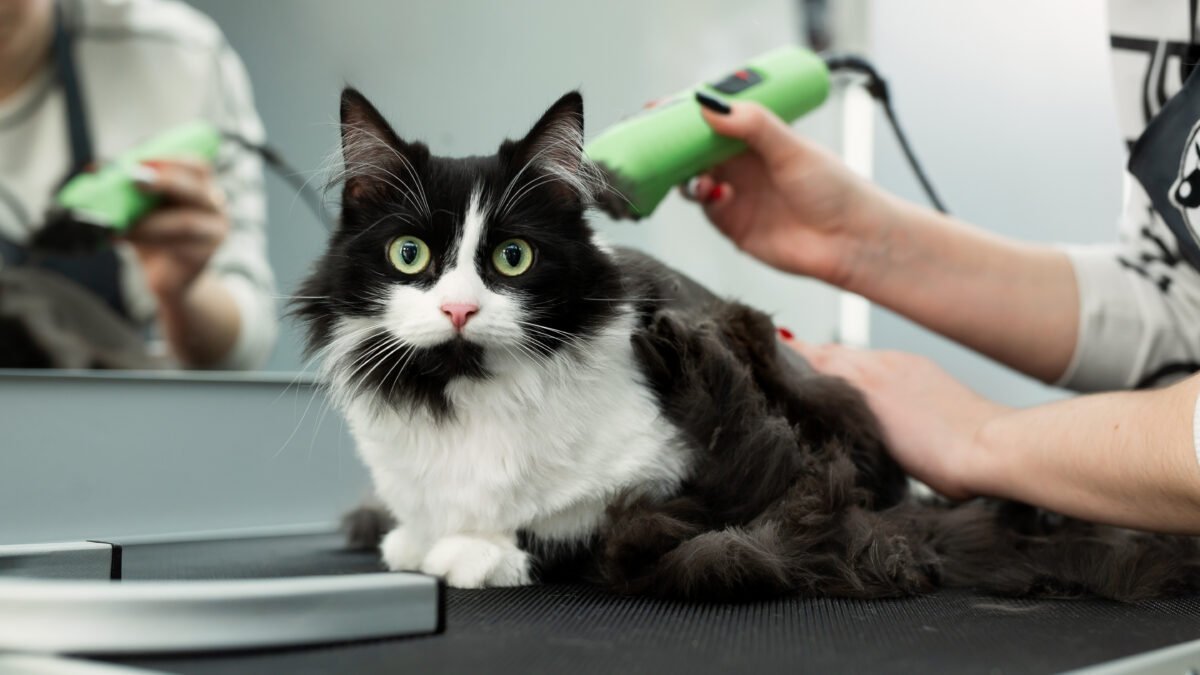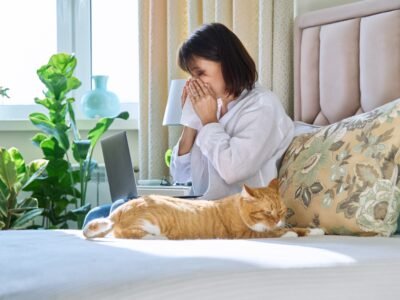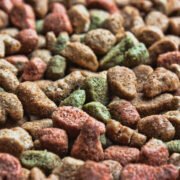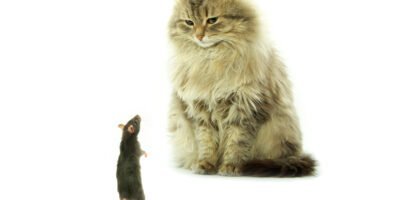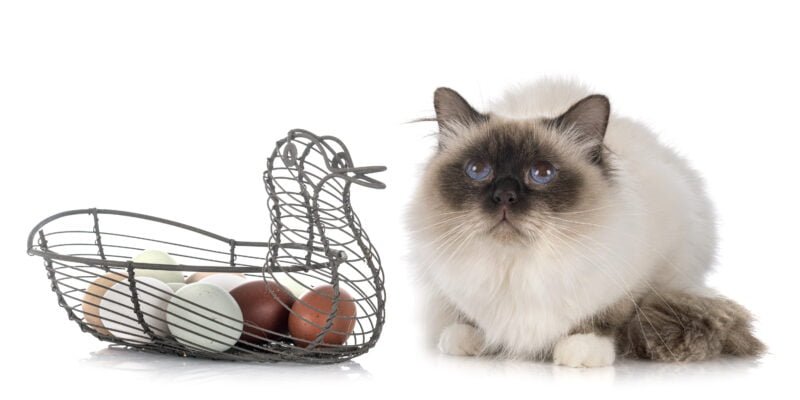
Are you looking for the ultimate guide to what cats can and cannot eat? Are you frustrated trying to figure out the answers to your questions? Look no further! This article will provide you with a comprehensive guide to what your cats can and cannot eat. Our expert research team has collected the essential information to answer your questions and provide you with a helpful guide. Learn what you should and should not be feeding your cats to keep them healthy and happy. We’ll also provide some background information on why certain foods are more beneficial than others. Be sure to read this article to learn everything you need to know about what cats can and cannot eat.
Common Foods That Cats Can Eat
Cats are obligate carnivores, meaning that their diet should consist of primarily animal-based proteins. Common foods that cats can eat include cooked chicken and turkey, beef, salmon, tuna, and whitefish, as well as eggs and dairy products. Commercial cat food is formulated to provide cats with all the nutrition they require, and should be the main source of food.
In addition to protein, cats need carbohydrates, fiber, and essential fatty acids. As such, it is also important to provide cats with a variety of fresh fruits and vegetables. Carrots, sweet potatoes, spinach, and apples are all great sources of nutrients for cats. It is also important to provide cats with a variety of grains such as oats, brown rice, and barley.
Overall, cats should be fed a balanced diet that meets the nutritional requirements set out by the Association of American Feed Control Officials (AAFCO). When providing cats with home-cooked meals, it is important to consult with a veterinarian in order to ensure all nutritional needs are being met. Additionally, cats should never be fed chocolate, raw eggs, onions, garlic, grapes, or raisins, as these can all be dangerous for cats. With the right knowledge and guidance, cats can stay healthy and happy with a varied and nutritious diet.
Common Foods That Cats Cannot Eat
Cats are obligate carnivores, which means they need a diet that is heavy in animal proteins. This doesn’t mean they should only eat meat – they need a balanced diet that includes plenty of other nutrients. A cat’s dietary needs change as they age, so it’s important to understand what they can and cannot eat. Common foods that cats should not eat include grapes and raisins, raw fish and meat, onions, garlic, beans, and dairy products such as milk and cheese. These foods can all cause digestive upset or illness in cats.
In addition to common foods that cats should not eat, there are several other items that cats should not ingest. This includes chocolate, caffeine, alcohol, apple seeds, and any products that contain artificial sweeteners. All of these items can be toxic to cats and should not be given to them. Salt is another substance that should be avoided as it can be dangerous for cats in large amounts. Additionally, some plants, such as lilies, can be toxic to cats.
It is important to research any new food before giving it to your cat to ensure it is safe. If you are unsure, it is best to consult your veterinarian to ensure your cat’s safety and well-being. The best way to ensure your cat is getting the necessary nutrition is to feed them a well-balanced diet of fresh, wholesome ingredients. By following these simple guidelines, you can help keep your cat happy and healthy.

Benefits of Feeding Cats the Right Foods
Cats require a balanced diet that is nutritionally sound and tailored to their individual needs. Feeding cats the right food can provide numerous benefits, from improved health to increased energy.
Firstly, cats that are fed the right food can enjoy better digestion and immune system health. This is due to the fact that premium cat foods contain vital nutrients such as protein, fiber, and essential vitamins and minerals that are essential for cats’ health. Additionally, feeding cats the right food can help lower the risk of obesity and diabetes, as well as the likelihood of developing certain diseases.
Secondly, cats that are provided with quality nutrition are less likely to be prone to developing certain health conditions, such as urinary tract infections. Quality cat foods can also help cats maintain a healthy weight, as they contain fewer calories and more beneficial nutrients than processed foods. Feeding cats the right food can also promote better dental health, as the food can help reduce plaque and tartar buildup.
Finally, cats that are provided with the right diet can enjoy increased energy and improved overall mood. A balanced diet that is specifically tailored to cats’ needs can provide them with the necessary nutrients that can improve their cognitive functions. This can help cats stay active and alert and can lead to improved behavior.
How to Tell if Your Cat is Allergic to Certain Foods
One question that cat owners commonly struggle with is whether their cats are allergic to certain foods. Unfortunately, there is no one definitive answer to this question; however, there are some signs that can help you determine if your cat is having an allergic reaction. Common signs of cat allergies include sneezing, wheezing, coughing, vomiting, and diarrhea. If your cat is experiencing any of these symptoms, it is important to take them to the veterinarian as soon as possible.
Another way to tell if your cat is having an allergic reaction is to observe their behavior when they are exposed to a certain food. If they seem uncomfortable or agitated, they may be having an adverse reaction. Additionally, if you see any changes in their coat or skin, such as redness, swelling, or skin irritation, this could also be indicative of a food allergy.
If you suspect that your cat is allergic to a particular food, it is important to remove it from their diet and consult with your veterinarian for further advice. Your veterinarian may recommend a food elimination trial to determine which food your cat is sensitive to, as well as dietary changes to ensure your cat is getting the nutrition they need.
Tips for Feeding Cats a Balanced Diet
Feeding your cats a balanced diet can be challenging, but it is incredibly important for their health and wellbeing. Cats are obligate carnivores, meaning their diet must be high in protein and low in carbohydrates. Here are some tips to ensure your cats get the nutrients they need:
• Feed your cats a variety of foods, including both wet and dry food. This will ensure they get the full spectrum of nutrients they need.
• When choosing wet food, look for ones that are high in protein and low in carbohydrates. Avoid foods with fillers and artificial preservatives.
• Make sure your cats get enough water. Dehydration can cause serious health issues for cats. Provide clean, fresh water at all times and make sure to change the water daily.
• Consider supplementing your cat’s diet with human-grade supplements, such as omega-3 fatty acids, taurine, and other vitamins and minerals. These will help ensure your cats get the full range of nutrients they need.
Feeding your cats a balanced diet is essential for their health and wellbeing. Make sure to provide a variety of wet and dry foods, avoid fillers and artificial preservatives, and consider supplementing with human-grade supplements. Following these tips will help ensure your cats stay healthy and happy.

Additional Resources for Further Education on Cat Nutrition
In addition to this article, there are many other resources available to help you further understand cat nutrition and what cats can and cannot eat. For example, the American Veterinary Medical Association (AVMA) provides a wealth of information on cat nutrition and diets. They offer guidelines on how much to feed your cat, what kind of food is best, and how to read labels and ingredients. The AVMA also offers advice on feeding kittens and senior cats, as well as information on feeding cats with special diets, such as those with allergies or diabetes.
The Cornell Feline Health Center is another great resource for cat owners looking to learn more about nutrition and diet. Their website provides detailed information on the nutritional needs of cats, as well as advice on how to feed cats in different life stages, from kitten to senior. They also offer helpful tips on avoiding common nutritional problems and keeping your cat healthy and happy.
Finally, the Association of American Feed Control Officials (AAFCO) is an excellent resource for pet owners who want to know what is and is not safe to feed their cats. The AAFCO website provides a list of approved pet food ingredients and a guide to selecting the best food for your cat. They also provide information on nutritional supplements and pet food labels, so you can ensure your cat is getting the best nutrition possible.
Frequently Asked Questions
Can Cats Eat Milk?
When it comes to diet, cats are often the source of much confusion. One of the most commonly-asked questions is: “Can cats eat milk?” The short answer is yes, cats can eat milk. However, it should only be consumed in moderation and as a treat. The reason for this is that many cats are lactose intolerant, meaning that when they drink milk, their bodies are unable to properly digest it. As a result, cats who consume too much milk may experience stomach upset, diarrhea, and vomiting.
If your cat loves milk and you want to include it as a treat, be sure to only provide lactose-free, pasteurized milk. This type of milk is made for cats and provides the necessary nutrients without causing any digestive issues. Whole milk is also an option but should only be given in small amounts. Be sure to check with your veterinarian to determine the best type of milk for your cat. Additionally, look for cat-friendly yogurt and cheese as these can be great alternatives to milk.

Can Cats Eat Eggs?
Yes, cats can eat eggs, but in moderation. Eggs are an excellent source of protein and other important vitamins and minerals. When feeding your cat eggs, you should make sure to cook them thoroughly and give only a small amount. You can offer eggs in either raw or cooked form. Raw eggs can sometimes contain salmonella and other bacteria, so it is important to make sure they are fully cooked before feeding them to your cat. Eggs can be a tasty treat for cats, but they should not be the main component of their diet.
Eggs can provide cats with a great source of protein, but they should not be overfed to cats. Too much protein can lead to an unhealthy weight gain and liver problems. If your cat begins to gain too much weight, it is best to reduce the amount of eggs being given. In addition, it is important to always make sure you properly cook the eggs before feeding them to your cat. Uncooked eggs can contain harmful bacteria, so it is best to always cook them before offering them to your cat.
Can Cats Eat Cheese?
When it comes to cheese, the answer is complicated. Cats can eat some types of cheese, but not all. Many cats have a strong preference for cheese and will happily eat it when offered. However, cheese is considered an occasional treat for cats and should not be a regular part of their diet. This is because cheese is high in lactose, which cats cannot digest properly, so it can cause digestive issues such as stomach upsets and diarrhea.
It is best to stick to softer cheeses such as cottage cheese or cream cheese, as they are easier for cats to digest. If your cat enjoys cheese, you can offer it as an occasional treat in small amounts. Make sure to monitor your cat’s reaction and stop feeding cheese if your cat experiences any digestive issues. Cheese can also be used as a training treat and can be a great way to reward your cat for good behavior.
Overall, cheese can be an occasional treat for cats, as long as it is given in moderation. However, it is important that you monitor your cat’s reaction to it and avoid any types of cheese that contain a lot of lactose, as these can cause digestive issues. Cheese can be a great way to reward your cat for good behavior and can make for a tasty treat.
Can Cats Eat Chocolate?
When it comes to the dietary needs of cats, one of the most frequently asked questions is if cats can eat chocolate. The short answer is “No.” Chocolate is highly toxic for cats and should not be given to them under any circumstances. Chocolate contains theobromine, a natural substance that is highly toxic for cats and can cause serious health problems, including seizures, coma, and even death. Additionally, chocolate contains caffeine, another stimulant that can be dangerous for cats.
It is important to note that chocolate is not the only food that is toxic for cats. Other common items, such as grapes, raisins, onion, garlic, apple seeds, and nuts, should also be avoided. If you are unsure of whether or not a food is safe for your cat, it is best to check with your vet or a pet nutritionist to get the proper advice. Feeding your cat the right diet is critical to their overall health and longevity. By avoiding potentially dangerous foods, you can help ensure that your cat lives a long and happy life.
Can Cats Eat Dog Food?
The short answer to whether cats can eat dog food is no. Cats require a specific balance of nutrients to stay healthy and dog food does not provide them with the proper nutrition. For example, cats need more protein than dogs, so they need foods specifically formulated to meet their needs. Dog food also tends to be higher in fat, which can lead to obesity in cats.
In addition to not providing the proper nutrition, dog food can also upset a cat’s stomach and even cause vomiting. Cats are also more sensitive to certain ingredients, like garlic, which is found in many dog foods but not recommended for cats. For these reasons, we recommend avoiding feeding cats dog food.
If you have both a cat and a dog, it is important to keep the two separate. Feed your cat a diet specifically designed for cats and provide your dog with food formulated for them. This will help ensure your pets are getting the nutrition they need and prevent health problems.

